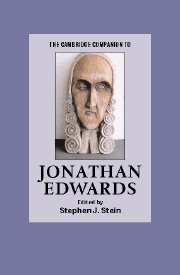Book contents
- Frontmatter
- Introduction
- Part I Edwards’s life and context
- Part II Edwards’s roles and achievements
- Part III Edwards’s legacy and reputation
- 11 Evangelical tradition in America
- 12 The reputation of Edwards abroad
- 13 Edwards and American literature
- 14 Edwards in “American culture”
- 15 Edwards’s intellectual legacy
- 16 Edwards and social issues
- The Works of Jonathan Edwards
- Further Readings
- Index
- Series List
16 - Edwards and social issues
from Part III - Edwards’s legacy and reputation
Published online by Cambridge University Press: 28 November 2007
- Frontmatter
- Introduction
- Part I Edwards’s life and context
- Part II Edwards’s roles and achievements
- Part III Edwards’s legacy and reputation
- 11 Evangelical tradition in America
- 12 The reputation of Edwards abroad
- 13 Edwards and American literature
- 14 Edwards in “American culture”
- 15 Edwards’s intellectual legacy
- 16 Edwards and social issues
- The Works of Jonathan Edwards
- Further Readings
- Index
- Series List
Summary
In March 1753 Jonathan Edwards wrote a letter to his twenty-one-year-old daughter Esther, who had been living away from home since her marriage the previous year to Aaron Burr, the president of the College of New Jersey and the pastor of a congregation in Newark. This letter was a reply to one Esther had written her mother, informing her that she was still suffering from “extreme weakness and distressing pains ” and asking for her comfort and advice. “Mothers, ” Laurel Thatcher Ulrich observes, “represented the affectionate mode in [the] essentially authoritarian mode of childrearing ” practiced in colonial New England. Although Esther had received the “unwearied kindness and tender care of ” her husband during her illness, she was also homesick and in need of a little mother-love. But her precarious physical and spiritual state demanded the stronger hand of a father. Edwards begins his letter in an affectionate fatherly tone, assuring his daughter that he and Sarah “are glad to hear that you are in any respect better, ” and expressing their concern “at your remaining great weakness. ” He quickly shifts, however, from his paternal to his pastoral voice, to address his daughter's spiritual condition, a topic more urgent than her physical health.
This new voice sounds distant, even cold and aloof. Taking Esther's illness as an occasion for her spiritual growth, Edwards severs the intimate parental bond that should tie a father to his sick child and positions his daughter at the same remove any seriously ill member of his congregation would occupy. He does not comfort her with the reassuring message that suffering and sickness are rare interruptions in a normally happy life. “I would not have you think, ” he cautions, “that any strange thing has happened to you in this affliction. ”
- Type
- Chapter
- Information
- The Cambridge Companion to Jonathan Edwards , pp. 325 - 344Publisher: Cambridge University PressPrint publication year: 2006

